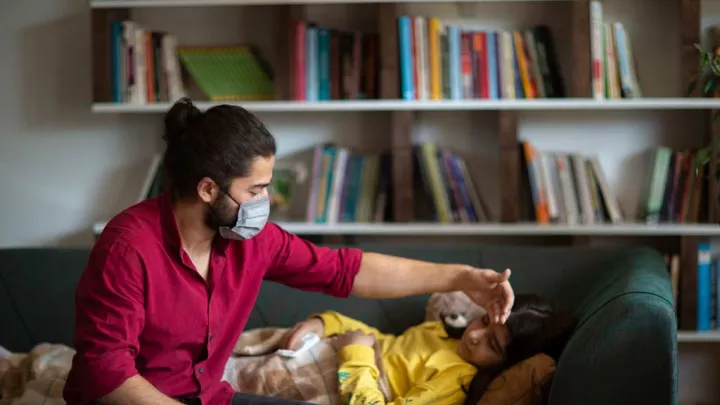
Decoding Your Baby's Cough
It’s always distressing to hear your little one cough. Still, it’s a common wintertime symptom, and it’s helpful to know that it often sounds worse than it is.
Cough is one of the most important defenses against respiratory tract illness. During respiratory tract infections, mucus is secreted into the airways as part of the response to infection, and coughing helps to clear this. Different types of cough can also provide valuable clues about your child’s illness.
"Babies less than 4 months old are obligate nose breathers, which means they are unable to coordinate breathing between their mouth and nose very well,” says Mona Patel, MD, a pediatrician and Vice President of Ambulatory Operations at Children’s Hospital Los Angeles. “If they have nasal congestion, it is important to suction and relieve mucus, which will help them feed better."
In infants over 3 months of age, a stuffy and runny nose can be very common. It’s easy for little noses to become congested because there isn’t much space there, and this is why many times babies can have some trouble breathing when they are congested. There are over 200 different cold viruses, and infants less than 6 months old are still building up their immune systems to be able to fight off these infections.
A runny nose doesn’t always mean infection. Discovering that the mucus coming out of your baby’s nose is a rainbow of colors can cause a lot of nervousness, but it is usually nothing to worry about. Especially during the winter, your baby’s nose tries to protect itself when it goes out into the cold air. It creates more mucus to keep itself moist and clear of particles. In the springtime, when flowers are blooming, a runny nose can be a sign of allergies.
What to do
- Keep nasal passages as clear as possible (congestion and postnasal drip will worsen the cough, especially during naptime or at night during sleep).
- Using a cool-mist humidifier in your child's bedroom will help moisten airways to reduce the coughing caused by postnasal drip.
- Give your child lots of liquids such as water or juice. Warm, decaffeinated tea may also help ease the tickle that sets off the cough. But if your child refuses to drink, try a cool popsicle.
- Offer a spoonful of honey before bed; it will coat the throat and alleviate soreness. (Only give honey to kids older than 1 year old. In babies younger than 1 year old, honey can cause botulism, a life-threatening illness.)
- Children's Tylenol or ibuprofen can keep babies comfortable if they have a fever. (Do not give your toddler cough or cold medicines. The U.S. Food and Drug Administration and the American Academy of Pediatrics warn they aren’t effective for young children and can put your toddler at risk for dangerous side effects.)
- For babies and toddlers who can't blow their noses yet, use nasal saline drops and a bulb aspirator to suction a runny nose. This is helpful especially before feeds, so a child can breathe easier while eating.
Try some of these home solutions early on, and if the cough is not improving or there are more worrisome signs, please consult with your pediatrician.
When to be worried about your child:
- Onset of cough within the first few weeks of life
- Cough with fever lasting more than five days
- A cough lasting for eight weeks
- A cough getting worse by the third week
- Associated difficulty in breathing or labored breathing
- Night sweats, weight loss, coughing up blood
- A wet or dry, hacking cough without wheezing or fast breathing, day or night
If your child's cough and stuffy nose persist for more than 10 days without improving, see your doctor. Your little one could have acid reflux, allergies, asthma or even enlarged adenoids, which inhibit breathing. Older kids could have sinusitis (a bacterial infection that's often brought on by a cold). In the winter, if a baby is coughing terribly, it could be respiratory syncytial virus (RSV), a dangerous viral infection for infants. Whooping cough is also a possibility. These are all reasons to seek medical advice immediately from your child’s physician.
Is there a way to tell if my child’s cough is COVID?
Unfortunately, not without testing. With COVID-19, it appears that symptoms last longer and some individuals may experience fatigue and loss of smell and taste that can persist for weeks. For others, there may be very limited symptoms. Whether or not you think your child has COVID-19, if they are having difficulty breathing, are unresponsive or unable to eat or drink, seek immediate medical care.


